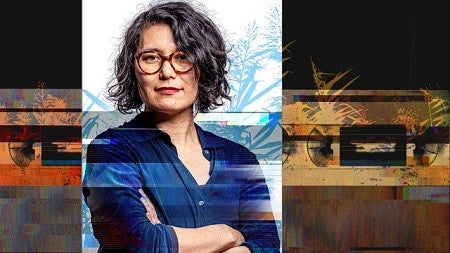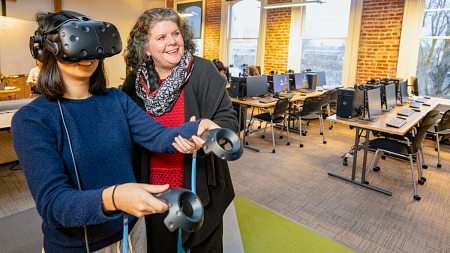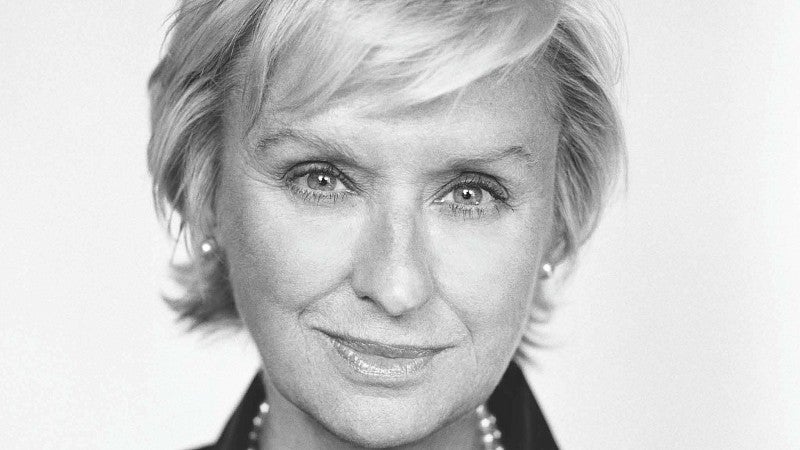
Sexism, the ‘New Yorker,’ and Making It as a Woman Journalist
Author and editor Tina Brown visits in February for the Center for the Study of Women in Society’s fiftieth anniversary
By Matt Cooper • Photo by Brigitte Lacombe • January 17, 2024
5 min read
“Stalin in high heels.” It’s a nickname Tina Brown doesn’t entirely reject. Between 1979 and 2001, she was the demanding editor in chief of Tatler, Vanity Fair, the New Yorker, and Talk. Brown also founded the live journalism platform Women in the World, which featured female leaders, CEOs, celebrities, and global activists during ten sold-out summits at New York’s Lincoln Center through 2020. She was inducted into the Magazine Editors’ Hall of Fame in 2007. Brown in 2023 founded the new investigative journalism summit Truth Tellers in London and she is guest curator of the 2024 Aspen Ideas Festival in Colorado.
Oregon Quarterly caught up with Brown ahead of a February 27 panel discussion at the University of Oregon, free and open to the public. The event is hosted by the Center for the Study of Women in Society in celebration of its fiftieth anniversary, in partnership with the School of Journalism and Communication.
Oregon Quarterly: How did you handle the sexism you faced as a journalist starting out and once you were in leadership at Condé Nast media company?
Tina Brown: A lot of the sexism that I encountered, I actually sort of hardly registered it as that at the time. It was the water we swam in, if you like. [At Condé Nast] I learned that my male colleague, who was editor of GQ magazine, was getting paid almost half more than I was, when I was actually the number one rainmaker at the company. I had to hire an agent to go in and make my case.
A lot of the time I wasn’t invited into the management meetings that actually impacted my destiny, while the male brass sat around making decisions that I didn’t think were correct. And was proven on several occasions that my anxieties were real. I did experience that. I think women still do.
OQ: What’s your advice to women facing sexism?
TB: My advice is to win. You just have to win, you have to prove that you were right, and in winning you have the leverage. Winning is power. If you want to reach the top, you have to work four times as hard, because you’re not going to get the same easy passage, frankly, that very often men get. I don’t think it’s really changed. I have a thirty-two-year-old daughter and I hear her on Zooms and I hear those same voices slightly drowning her out and coming to her last and all of those things that one recognizes only too well. You’ve got to keep fighting.
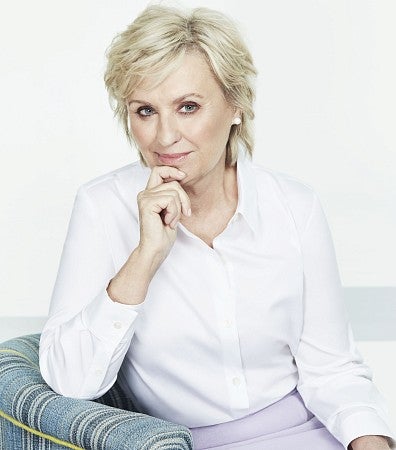
OQ: You have some interesting similarities to Jane Grant, a no-nonsense journalist and feminist in the 1920s who cofounded the ‘New Yorker’ and in whose name her second husband made a massive gift that established the Center for the Study of Women in Society. What do you make of her?
TB: I knew very little about the history of this wife of [New Yorker cofounder] Harold Ross. She gets written out of the story, doesn’t she, as the cofounder. I was a huge fan of Harold Ross in the sense that I felt my New Yorker was very much going back to the Harold Ross New Yorker [of the 1920s], but who knows how much of that DNA was Jane Grant’s?
OQ: The UO has Grant’s papers and she is, of course, celebrated by the center. Like you, Grant helped guide both content and business at the ‘New Yorker.’ And like you, she hired women—among them, Janet Flanner, whose “Letter from Paris” column was a longtime staple of the magazine.
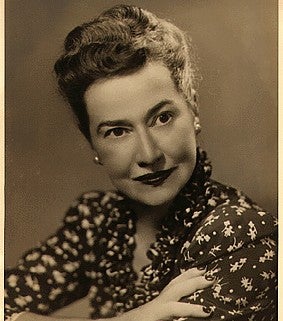
TB: I changed the culture of the New Yorker and made it sort of a matriarchy. I basically replaced so many of the male editors with women editors. My managing editor, my executive editor, the cartoon editor, the art director, they were all women I brought in.
The New Yorker became home to some really great women writers over the years, from Lillian Ross and Janet Malcolm to Edith Oliver—they were all there when I got there and they were wonderful ladies, I got on with them all so well, they were thrilled that a woman had come aboard.
But certainly when I had my very first meeting there, I came over to the magazine from Vanity Fair and I sat down at this long boardroom table and at the table were all . . . these . . . guys. Sitting there with Coke-bottle glasses all staring at me with an ill-concealed hostility. Particularly the cartoonists. Cartoonists are the most grumpy group of people you’ll ever meet. The funnier the cartoon, the more grumpy the cartoonist. So they were all giving me these baleful looks and I remember thinking, “My god, I’ve just come out of Vanity Fair, where everyone was either a woman or gay, and suddenly I’m in this room with all of these really WASP-y guys.” But we changed the blood and we got it running in a different direction. It was thrilling.
OQ: The theme of this issue is “Mighty Women of Mighty Oregon.” Who is the mighty woman who inspired you?
TB: Certainly in editing, I was pretty fascinated with Clare Boothe Luce [an American writer, politician, US ambassador, and public conservative figure]. She was a terrific journalist—like Jane Grant, she had a rapier pen—she was the managing editor of Vanity Fair, very young.
When she married Henry Luce, publisher of Time, Life, and Fortune, she called herself Clare Boothe Luce and continued to use her maiden name. Rather like me—when I married my husband, Sir Harold Evans, he was editor of the Sunday Times—she left the paper. I didn’t want to be “the girlfriend,” nor did she. And of course she wrote her plays and she became so many other things. I liked her ability to reinvent. She was a woman of many facets at a time when multihyphenate women were not the norm.
OQ: What is the legacy of Women in the World?
TB: For ten years, we brought together the most remarkable global women, women people had never heard of. [Filipino journalist] Maria Ressa, who went on to get a Nobel Prize. Women like Liberian peace activist Leymah Gbowee, who also went on to get a Nobel Prize. We found these women and brought their voices to the stage and helped elevate their stories. I feel pretty good about the amazing community of global women with powerful voices that we were able to showcase.
Want to celebrate a Mighty Woman of the University of Oregon? Send us your submission before Women’s History Month in March.
Matt Cooper is managing editor for Oregon Quarterly.



